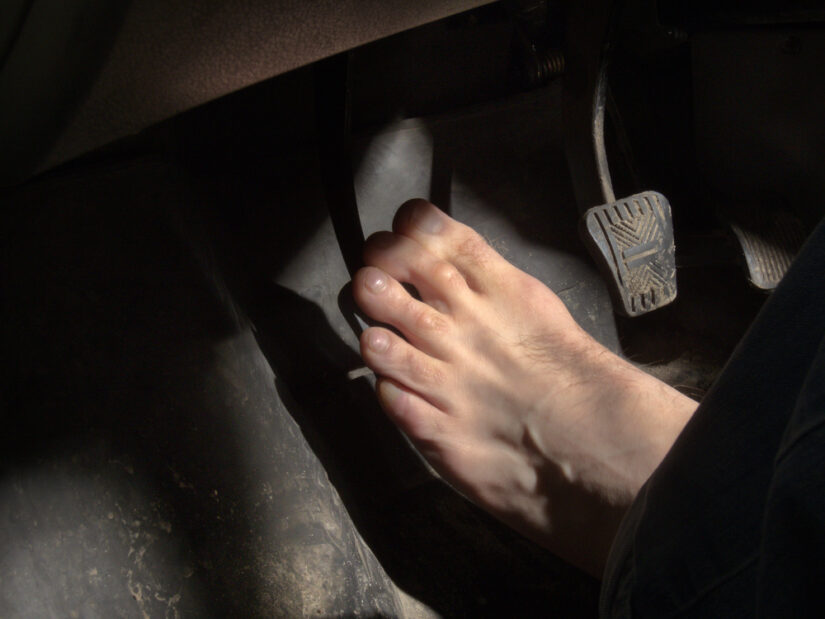
Driving barefoot is a topic that often sparks curiosity and debate among drivers in California. The idea of hitting the road without shoes might seem unconventional, or even unsafe, to some. Yet, it is entirely legal to drive without shoes in California. While some drivers worry about potential risks, the state’s vehicle code doesn’t prohibit driving barefoot.
The misconception about the legality of barefoot driving is not unique to California; it is a widely held belief across the United States. Despite the absence of laws mandating footwear, some experts caution that driving without shoes could be less secure. Concerns typically revolve around the driver’s ability to react in emergency situations with the same agility and control as they would with proper footwear.
Given these points, the debate often shifts to personal preference and safety awareness rather than legality. By exploring the reasons behind this long standing misconception and the potential safety implications, readers can better understand the nuances of barefoot driving and make informed choices on their own safety while navigating the roads.
Legal Status of Driving Barefoot in California
Driving barefoot in California is a topic that often sparks curiosity. While it may seem unconventional, the legality of this practice is straightforward and based on specific provisions within California traffic laws.
Is Driving Without Shoes Legal in CA?
California traffic laws do not prohibit driving without shoes. According to the California Vehicle Code, there are no specific footwear requirements for drivers. This means individuals can operate a vehicle without any form of footwear. The lack of such a law clarifies that the focus is on safe driving conditions rather than footwear regulations.
Nevertheless, while the legal framework permits barefoot driving, safety remains paramount. The potential for reduced pedal control due to sweating feet or slippery surfaces is a concern and can impact driver safety. Therefore, while legal, drivers should consider these factors when deciding to drive without shoes for optimal safety.
Legal Clarifications on Barefoot Driving
It’s a common misconception that driving barefoot is illegal in California. This myth persists despite the absence of laws against it. The California Highway Patrol has confirmed that there are no state laws prohibiting barefoot driving, highlighting its legality across all states.
However, being aware of accident liability is important. If an accident occurs while driving without shoes, the driver’s choice of footwear, or lack thereof, could be scrutinized in terms of negligence. Understanding these legal nuances helps ensure that drivers make informed decisions regarding their safety and liability on the road.
Pros and Cons of Barefoot Driving in California
Driving without shoes offers a unique experience that can feel liberating and more natural to some drivers. However, there are several safety concerns and potential legal implications to consider, especially since this practice is often surrounded by myths and misconceptions.
Benefits of Driving Without Shoes
Many drivers find greater comfort in driving barefoot, as it allows for a more tactile connection with the vehicle’s pedals. This improved sensation can help in making precise movements, which some believe enhances control and response times. Beyond this, avoiding shoes eliminates distractions caused by ill-fitting or uncomfortable footwear that might slip or become entangled with pedals.
Barefoot driving also provides the advantage of reducing foot fatigue, particularly on long journeys. This is because shoes, especially those with high heels or thick soles, can sometimes restrict the natural movement of the foot, causing discomfort over time. Flexibility and ease of movement are key benefits often cited by those who prefer this driving method.
Potential Risks and Safety Concerns
Despite the comfort associated with barefoot driving, there are significant safety risks. Pedals can become slippery when pressure is applied with bare skin, increasing the likelihood of losing grip. Moreover, bare feet might lack the strength to apply the necessary force in emergency situations, potentially leading to accidents.
Additionally, driving without shoes can make feet vulnerable to injury from sharp objects or extreme temperatures inside the car. These hazards can distract a driver and reduce reaction time if something goes wrong. Legal issues may arise if an accident occurs, as insurance companies could argue that it contributed to negligent driving behaviors.
Dispelling Common Myths
A widespread belief is that driving barefoot is illegal in California. This is a myth. There are no laws in the state that prohibit barefoot driving. Many drivers mistakenly think regulations exist concerning footwear, but legality isn’t an issue.
Misunderstandings
- Safety Concerns: Some argue that driving barefoot poses safety risks. While true that foot slippage is possible, it doesn’t make the act illegal. Safety recommendations don’t equate to laws.
- Regulatory Confusion: Many believe that traffic regulations dictate specific footwear. In reality, they focus on vehicle operation safety. Proper control is key, regardless of footwear choice.
- DMV Guidelines: The California DMV suggests against barefoot driving due to potential hazards. These are merely recommendations without legal implications.
These points highlight common misconceptions about traffic regulations and legality. Myths often stem from safety concerns rather than any actual legal mandates.
Understanding these myths helps dispel confusion and guides informed decisions about driving practices. Although safety is always essential, knowing what is truly illegal or merely a recommendation is crucial for drivers.

Impact on Personal Injury Claims and Legal Assistance
Driving habits, such as choosing to drive barefoot, might influence the outcomes of personal injury claims after an accident. Understanding the potential legal implications and when to seek legal advice is essential for navigating these situations effectively.
Influence of Driving Habits on Injury Claims
Driving barefoot is not inherently illegal in California, nor is it explicitly prohibited in any state law. However, if an accident occurs, driving without shoes might be scrutinized depending on the circumstances. An insurer or opposing party may argue that lack of footwear contributed to an accident by impairing vehicle control.
Each case will be assessed individually, considering how significant the driving habit was in contributing to the incident. Lawyers examining personal injury claims will evaluate evidence such as witness accounts and police reports. It’s essential to document the scene and conditions following an accident. Whether or not being shoeless had a role in the mishap could impact settlement negotiations or court proceedings.
Seeking Legal Help After an Accident
Consulting with a legal expert following an accident is crucial, particularly if there’s concern regarding driving habits and their potential impact on liability. An attorney specializing in personal injury can offer guidance on whether your driving habits might be used against you in a claim.Maho Prentice, LLP, knowledgeable in accident legal help, can provide advice tailored to the specifics of each case. A skilled lawyer will assess the details, advise on the merits of the claim, and represent the client in negotiating settlements. Engaging legal assistance early ensures that rights are protected and the best possible outcome in a claim is pursued.